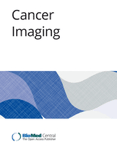
CANCER IMAGING
Scope & Guideline
Connecting Researchers to the Future of Cancer Imaging
Introduction
Aims and Scopes
- Multimodal Imaging Techniques:
The journal explores various imaging modalities, including PET, CT, MRI, and ultrasound, focusing on their roles in cancer detection, treatment response assessment, and prognostication. - Radiomics and Machine Learning:
A significant emphasis is placed on radiomics, which involves extracting a large number of features from medical images to predict clinical outcomes, and the application of machine learning algorithms to improve diagnostic accuracy. - Theranostics in Cancer Imaging:
The journal highlights the development and application of theranostic agents and imaging techniques that enable personalized treatment strategies for cancer patients. - Clinical Applications and Outcomes:
Research published in the journal often evaluates the clinical efficacy of imaging techniques in predicting treatment outcomes, recurrence, and survival rates in cancer patients. - Innovative Technologies and Methodologies:
The journal actively seeks contributions on new imaging technologies and methodologies, such as hybrid imaging, advanced spectroscopy, and artificial intelligence applications, to further enhance cancer imaging capabilities.
Trending and Emerging
- Integration of AI and Deep Learning:
The use of artificial intelligence and deep learning in imaging analysis has surged, with numerous studies focusing on these technologies for automating image interpretation and enhancing diagnostic accuracy. - Radiomics for Prognosis and Treatment Response:
Radiomics, particularly its application in predicting treatment response and patient prognosis, has become a prominent theme, showcasing its potential to personalize cancer treatment. - Theranostic Imaging Approaches:
Emerging research emphasizes the role of theranostics, where imaging informs treatment decisions and outcomes, highlighting a shift towards personalized medicine in oncology. - Multimodal Imaging Strategies:
There is a growing trend towards using multimodal imaging approaches, combining various imaging modalities to improve diagnostic capabilities and treatment monitoring. - Patient-Centric Imaging Studies:
Recent publications reflect a shift towards understanding patient outcomes from imaging studies, focusing on real-world applications and the impact of imaging on treatment decisions.
Declining or Waning
- Conventional Imaging Techniques:
There is a noticeable decrease in the publication of studies focused solely on conventional imaging techniques without the integration of advanced methodologies like machine learning or radiomics. - Single-Modality Studies:
Research that examines the efficacy of a single imaging modality, such as standalone CT or MRI, without a multimodal approach is becoming less prevalent, as the field increasingly favors integrated imaging solutions. - Basic Imaging Protocols:
Papers detailing standard imaging protocols or basic imaging findings are less frequently published, with a shift towards studies that evaluate the predictive value or clinical impact of imaging findings. - Historical Comparisons:
There is a diminishing focus on retrospective studies that compare historical imaging data or techniques, as the journal moves towards more innovative, forward-looking research.
Similar Journals
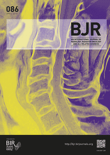
BRITISH JOURNAL OF RADIOLOGY
Shaping the Future of Imaging through Rigorous ResearchBritish Journal of Radiology is a leading peer-reviewed journal published by the British Institute of Radiology, dedicated to advancing the field of radiology, nuclear medicine, and imaging. With a prestigious history dating back to 1945, this journal is at the forefront of disseminating cutting-edge research and innovations that significantly impact clinical practice. Currently enjoying a Q1 ranking in the field of radiology and Q2 in general medicine for 2023, it is recognized for its rigorous standards and high-quality content, ranking #87 out of 333 in Scopus for specialties related to Medicine, Radiology, Nuclear Medicine, and Imaging, placing it in the 74th percentile. Researchers, professionals, and students are encouraged to engage with the latest findings and comprehensive reviews presented within its pages, which contribute not only to academic discourse but also to the evolution of practice in the wider medical community.

Radiologia Medica
Exploring the Frontiers of Nuclear Medicine and Imaging.Radiologia Medica, published by Springer-Verlag Italia SRL, is a premier Italian journal dedicated to the field of radiology, nuclear medicine, and imaging. With a rich history dating back to 1947, this journal has consistently provided cutting-edge research and findings, contributing significantly to advancements in medical imaging techniques and practices. As evidenced by its impressive Q1 rankings in both Medicine (Miscellaneous) and Radiology, Nuclear Medicine and Imaging, Radiologia Medica holds a prestigious position within the top tier of medical journals, ranked #11 out of 333 in its category and residing in the 96th percentile according to Scopus metrics. Although it is not currently offered as an Open Access journal, its robust subscription model supports extensive research dissemination. Researchers, professionals, and students alike will find invaluable insights and knowledge critical for advancing their understanding and practice within this dynamic field. Situated in Milan, Italy, Radiologia Medica continues to be an influential platform for the exchange of high-quality research, bridging various disciplines and promoting excellence in radiological science.
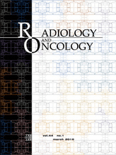
Radiology and Oncology
Leading the way in diagnostic imaging and cancer research.Radiology and Oncology is a prominent open access journal that has been instrumental in advancing the fields of radiology and oncology since its inception in 1992. Published by SCIENDO in Germany, this journal aims to disseminate high-quality research articles, reviews, and case studies that address critical issues in diagnostic imaging and cancer treatment. As of 2023, it holds a commendable impact factor within the Q2 category for Radiology, Nuclear Medicine, and Imaging, and a Q3 standing in the field of Oncology—reflecting its importance in these critical areas of medicine. With a focus on promoting innovative research and interdisciplinary collaboration, Radiology and Oncology is indexed in Scopus, where it ranks #122 among 333 in its category and #187 among 404 in Oncology, showcasing its wide-reaching impact and relevance. The journal is fully open access since 2007, ensuring that vital research is accessible to the global medical community and fostering advancements in patient care strategies and therapeutic methodologies. By providing a platform for the latest developments and discoveries, Radiology and Oncology is a pivotal resource for researchers, clinicians, and students dedicated to improving outcomes in cancer care through innovative imaging techniques.
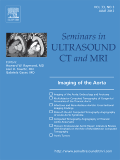
SEMINARS IN ULTRASOUND CT AND MRI
Transforming Knowledge into Imaging ExcellenceSEMINARS IN ULTRASOUND CT AND MRI is a prestigious academic journal dedicated to advancing the fields of radiology, nuclear medicine, and imaging. Published by W B SAUNDERS CO-ELSEVIER INC, this journal has been a cornerstone of scholarly communication since 1984, providing a platform for high-quality research and review articles that enhance the understanding of diagnostic imaging techniques. With a current impact factor reflected in its Q3 quartile ranking among 333 journals in its category, it remains a valuable resource for researchers and clinicians alike. The journal's focus includes but is not limited to innovations in ultrasound, computed tomography, and magnetic resonance imaging, making it essential for professionals looking to stay at the forefront of imaging science. While it operates under a subscription model, its extensive archive of influential articles ensures ongoing access to critical knowledge and developments in the field. With a commitment to quality and relevance, SEMINARS IN ULTRASOUND CT AND MRI continues to contribute significantly to the evolving landscape of medical imaging.

Journal of the Belgian Society of Radiology
Empowering Radiologists with Open Access InsightsThe Journal of the Belgian Society of Radiology, published by UBIQUITY PRESS LTD, is a pivotal resource in the field of radiology, nuclear medicine, and imaging. With an ISSN of 2514-8281 and E-ISSN of 2514-8281, this open access journal has been dedicated to fostering the dissemination of high-quality research since its establishment in 2010. Distributed from the United Kingdom, it offers a platform for innovative studies, case reports, and reviews that contribute to the advancement of radiological sciences. Despite its current Q4 category ranking within Scopus, the journal plays a critical role in sharing essential findings with a community of over 1,200 professionals and students eager to stay abreast of emerging trends and technological advancements in imaging. By enabling unrestricted access to its publications, the journal encourages collaborative research and knowledge exchange that transcends geographic boundaries, solidifying its importance for both established researchers and emerging scholars in the discipline.

European Journal of Hybrid Imaging
Unlocking the Potential of Hybrid Imaging ResearchEuropean Journal of Hybrid Imaging, published by SpringerNature, stands as a pivotal platform for scholarly discourse in the rapidly evolving fields of hybrid imaging technologies and methodologies. Since its inception in 2017, this open access journal has significantly contributed to the interdisciplinary interface of biophysics, computer science, molecular medicine, and radiology. With its current standing in the Q2 and Q3 quartiles across various categories, it provides valuable insights and research outputs pertinent to both academic and clinical practitioners. The journal's rigorous peer-review process ensures the highest standards of scholarly integrity, while its open access format promotes global accessibility and encourages collaborative research efforts. Covering a diverse range of topics pertinent to hybrid imaging, the journal serves as an essential resource for researchers, professionals, and students alike, fostering innovation and knowledge exchange within the scientific community.
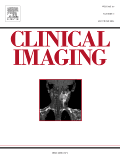
Clinical Imaging
Exploring New Frontiers in Clinical ImagingClinical Imaging, published by Elsevier Science Inc, is a renowned journal dedicated to the field of radiology, nuclear medicine, and imaging. With an ISSN of 0899-7071 and an E-ISSN of 1873-4499, this esteemed publication has established its significance in advancing imaging science since its inception in 1989 and continues to make impactful contributions to the discipline through 2024. The journal holds a prestigious Q2 ranking in the category of Radiology, Nuclear Medicine, and Imaging, reflecting its critical role in bridging research and clinical practice. Currently ranked #113 out of 333 by Scopus, with a notable 66th percentile, it offers a platform for disseminating high-quality research, reviews, and case studies that inspire innovation and enhance imaging techniques. Although it primarily functions as a subscription-based journal, it remains dedicated to accessibility and the dissemination of pivotal findings that inform both academia and clinical settings. Clinical Imaging is essential for researchers, professionals, and students alike, offering insights that shape the future of diagnostic imaging.

American Journal of Nuclear Medicine and Molecular Imaging
Transforming Medical Insights with Cutting-Edge Imaging TechniquesThe American Journal of Nuclear Medicine and Molecular Imaging (ISSN: 2160-8407), published by E-CENTURY PUBLISHING CORP, is a distinguished platform for the dissemination of cutting-edge research in the fields of nuclear medicine and molecular imaging. With a commitment to advancing scientific inquiry and clinical applications, this journal serves as a vital resource for researchers, clinicians, and students dedicated to exploring innovative imaging modalities, radiopharmaceuticals, and their applications in diagnosing and treating various medical conditions. Although currently not available as an open-access journal, this publication plays a crucial role in fostering academic dialogue and collaboration within the medical community. Its diverse range of topics and expert contributions underscore its impact in bridging the gap between research findings and clinical practice, making it an essential read for anyone interested in the rapidly evolving landscape of nuclear medicine and imaging technologies.
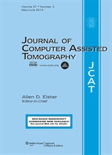
JOURNAL OF COMPUTER ASSISTED TOMOGRAPHY
Advancing Diagnostic Imaging through InnovationJOURNAL OF COMPUTER ASSISTED TOMOGRAPHY, published by Lippincott Williams & Wilkins, stands as a vital resource in the field of Radiology, Nuclear Medicine, and Imaging. Since its inception in 1977, this journal has been dedicated to advancing the understanding and application of computer-assisted tomography, emphasizing innovative research and clinical practices that enhance diagnostic imaging techniques. With an impact factor reflective of its rigorous scholarship and relevance—ranking in the Q3 category—the journal serves as an essential platform for contributors and readers alike, navigating the challenges and opportunities within a rapidly evolving field. Researchers, professionals, and students are encouraged to engage with the rich repository of articles that cover emerging technologies, clinical applications, and theoretical advancements, collectively fostering a deeper comprehension of imaging sciences. Although not currently designated as an open-access journal, it continues to enhance discourse in the community from its headquarters in Philadelphia, PA, maintaining a commitment to the highest standards of academic excellence.

EUROPEAN RADIOLOGY
Catalyzing Breakthroughs in Imaging TechnologiesEUROPEAN RADIOLOGY, published by SPRINGER, stands as a prestigious international journal in the field of radiology, nuclear medicine, and imaging, with an impressive impact factor that underscores its significance among peers. With an ISSN of 0938-7994 and an E-ISSN of 1432-1084, this journal provides a platform for cutting-edge research and advancements in medical imaging from 1991 to 2024. Recognized as a Q1 journal in both general Medicine and the specialized Radiology category by 2023, EUROPEAN RADIOLOGY ranks an impressive #17 out of 333 in its field according to Scopus, placing it in the 95th percentile. While it does not currently offer Open Access options, the journal remains essential reading for researchers, professionals, and students striving to stay at the forefront of developments in diagnostic imaging and related technologies. By contributing to a comprehensive understanding of radiological practices, EUROPEAN RADIOLOGY plays a crucial role in shaping the future of medical diagnosis and patient care.